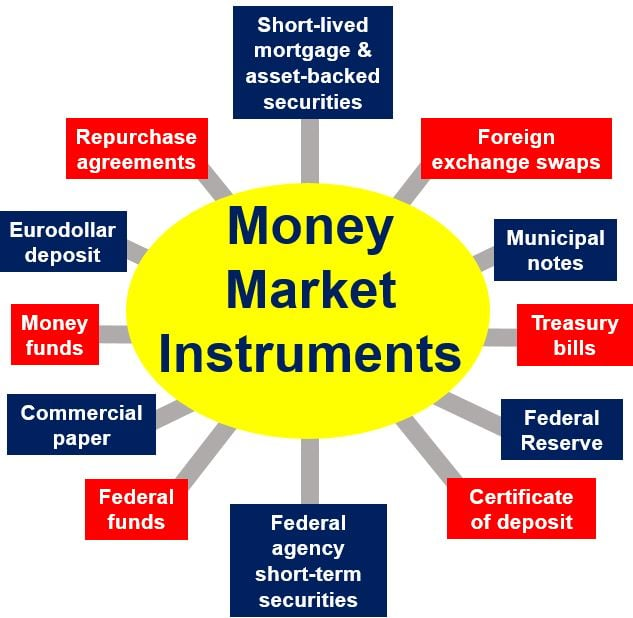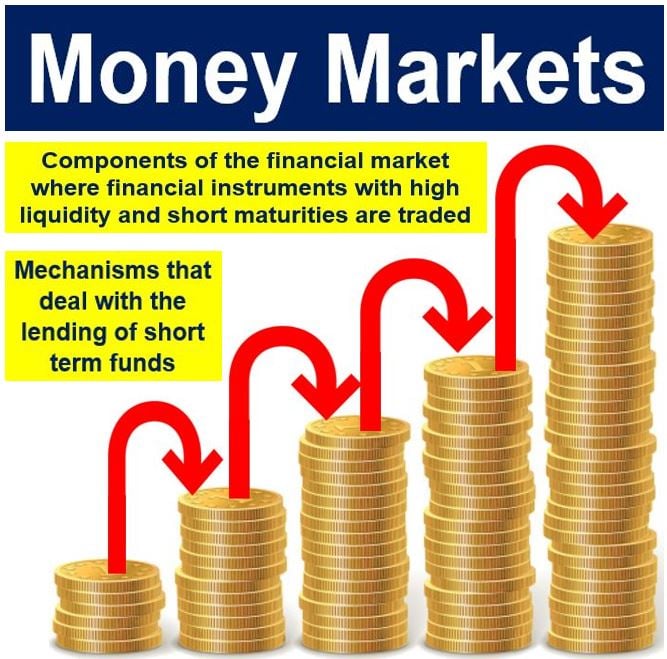The term Money Markets refers to any market where money and several types of liquid assets are lent and borrowed for between a few hours and a year. They are places where banks, retail investors, and money managers can make short-term investments, and banks, hedge funds, broker-dealers, and non-financial corporations have access to low-cost funds.
Money markets is an umbrella term that covers a range of market types, which can vary depending on the needs of the borrowers and lenders.
Regulatory bodies worldwide work to ensure transparency and security in money markets, seeking to protect investors and maintain financial stability.
Not to be confused with capital markets, which is part of the financial system where longer-term investments such as bonds and shares are traded.

According to the OECD Glossary of Statistical Terms by definition:
“A money market is a market where debt securities, issued with maturities of one year or less, are traded.”
Liquidity for the financial system
Money markets and capital markets – which make up the financial market – provide liquidity for the global financial system.
They are called money markets because the assets that are traded are short-term and can normally be converted easily into cash.
In money markets, inter-bank loans are arranged, as are money market mutual funds, commercial paper, term certificates of deposit, Treasury bills, municipal notes, federal funds, CDs (negotiable certificates of deposit), Eurodollar deposits, repurchase agreements (repos), and securities lending.

According to the Federal reserve Board’s Flow of Funds Survey, money markets represent about one third of all credit in the United States. In the advanced economies, they account for an important part of all borrowing.
Money market transactions involve huge amounts of money – they are wholesale – and take place between companies and financial entities rather than private individuals. Individuals who want to invest smaller amounts in these types of assets can do so through money market funds.
The instruments that are traded carry varying maturities, credit risks, currencies and structures, and thus are used to distribute exposure.
Participants in money markets
Money market players include banks that lend to other banks and to commercial enterprises in the time deposit and eurocurrency markets, corporations that raise money by offering commercial paper that may be purchased by other businesses or funds, and investors that buy CDs as a secure place to deposit their money over the short-term.
Central governments issue US-style Treasury bills in the money markets, which have maturities from just a few days to twelve months. They may only be purchased directly from the government by primary dealers, who can then sell smaller amounts to individual investors. Municipal and regional (state, county) governments also issue short-term notes.
Commercial paper, whose maturity ranges from overnight to several months, is popular with corporate investors because they pay higher rates than Treasury bills or bank time deposits. However, with commercial paper there is a greater risk of default.
Finance companies generally fund themselves by issuing huge amounts of ABCP (asset-backed commercial paper), which is secured by the pledge of eligible assets into an ABCP conduit. Eligible assets include residential/commercial mortgage loans, credit card receivables, mortgage backed-securities, auto loans, and other financial assets.
Some large multinationals with pristine credit ratings, such as General Electric, get credit for themselves by issuing commercial paper. Many large companies get banks to issue commercial paper on their behalf.
Functions of the money markets
Money markets have five functions:
-
To finance industry
By securing short-term loans to meet industry’s working capital requirements through the system of commercial papers, finance bills, etc.
-
To finance trade
They play a crucial role in financing both domestic and international trade. Traders get finance through bills of exchange, which are discounted by the bill market. Discount markets and acceptance houses help in providing finance for international trade.
-
To invest profitably
They enable commercial banks to use their surplus funds in profitable investments. Commercial banks’ main objective is to earn income from their reserves. However, they must also maintain liquidity to meet unexpected cash demands from depositors.
These excess reserves are invested in near-money assets such as short-term bills of exchange, which can be converted into cash easily. In this way, commercial banks kill two birds with one stone: 1. Maintain liquidity. 2. Earn profits.
-
To improve commercial banks’ self-sufficiency
In emergency situations, when a commercial bank is short of funds, it does not have to ask the central bank for help and borrow at higher interest rates.
-
To help central banks
Even though they are able to function and influence the banking system without money markets, their existence helps smooth the functioning and enhances the efficiency of central banks.
Advancements in financial technology have further streamlined money market transactions, allowing for improved real-time processing and enhanced market efficiency.
Money Markets – vocabulary and concepts
In the world of “money markets,” there are many compound phrases. A compound phrase is a term that consists of at least two words. Let’s have a look at some of them, their meanings, and how they are used in a sentence:
-
Money Market Account
A type of savings account that typically offers a higher interest rate in return for larger deposit balances.
Example: “She decided to put her savings into a money market account for better interest rates compared to a standard savings account.”
-
Money Market Yield
The return or interest earned on investments within the money market.
Example: “The finance manager assessed the money market yield as a benchmark for the company’s short-term investment performance.”
-
Money Market Fund
A mutual fund that invests in short-term, high-quality, liquid debt instruments.
Example: “Investors looking for low-risk options turned to the money market fund for short-term placements.”
-
Money Market Instrument
Financial instruments used for borrowing and lending in the short-term money market, like Treasury bills and commercial paper.
Example: “The treasury department diversified its portfolio with several money market instruments to manage liquidity.”
-
Money Market Operations
Activities conducted by central banks to control liquidity and interest rates in the financial market.
Example: “The central bank’s money market operations were aimed at stabilizing the currency amid economic uncertainty.”
-
Money Market Trader
A professional who specializes in buying and selling money market securities.
Example: “The money market trader closely monitored the interest rates for signs to adjust the trading strategy.”
Video – What are Money Market?
This educational video, from our sister channel on YouTube – Marketing Business Network, explains what the term ‘Money Markets’ means using simple and easy-to-understand language and examples.
